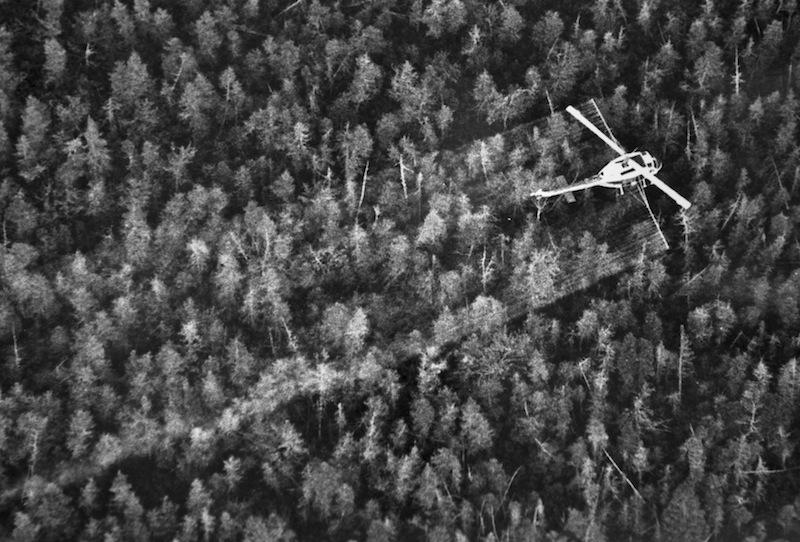AUGUSTA — Three decades ago, an insidious pest called the spruce budworm wreaked devastation on Maine’s forests, defoliating millions of acres of the state’s abundant fir and spruce trees until they were dry sticks.
The infestation, which began reaching its worst stages in the late 1970s, prompted a small-scale air war, first with chemicals sprayed from aircraft and later with biological insecticides. At last, by the later 1980s, the budworms went away.
But experts now say the bugs may soon descend upon Maine again.
“We are taking this seriously,” said state entomologist Dave Struble.
Forestry officials are keeping a close eye on Canada, said Struble. There’s been “a ripping outbreak” on the northern shore of the St. Lawrence River in Quebec, prompting an aerial spraying operation, and defoliation is detected on the south shore, he said. In New Brunswick, reports of budworm caterpillars picked up during the summer, but whether they were moving toward Maine isn’t known, Struble added.
Mindful of the cyclical pattern of infestations, Maine foresters set have turned up some budworms in traps they set, but “we don’t know exactly what it means,” said Struble. That’s because the best type trap being used was not around yet before the last big outbreak.
“But we’ve also been following what’s going on with the neighbors,” said Struble.
Budworm larvae bore into and feed on the evergreens’ needles or expanding buds. Gradually the needles turn brown, giving the defoliated tree a scorched appearance, according to the U.S. Department of Agriculture.
After a small wave of budworms came and went in the 1950s and ’60s, taking some trees with it, the state was hit by a tsunami of the pests in the 1970s and ’80s. The invasion was taken very seriously by paper companies that owned vast blocks of Maine’s forests because it threatened the raw material for their products.
That prompted an all-out attack on the budworms, with aircraft laden with chemical insecticides dispatched for much of the day from outposts in northern and eastern Maine to treat an area the size of Connecticut.
The massive operation also touched off howls of protest from residents of those remote regions, who were concerned about the health and environmental effects of the spray program. The program was paid for by the landowners, managed by the state and carried out by private contractors.
As it began to wind down in the mid-’80s, sprayers turned to a biological insecticide known as Bt, which interferes with insects’ digestion and causes them to starve to death or die from infection.
Now, after a generation of calm, officials don’t know whether to expect a sizeable outbreak in Maine. Part of the equation is weather — the insects favor warmer, earlier springs — and whether trees are at a susceptible stage. Struble said the trees now are not so vulnerable because they’re younger and more resistant to infestation.
“We’re probably not going to have the big one now,” said Struble. But that could change with the right, or wrong, conditions.
Doug Denico, director of the Maine Forest Service, said Maine will probable see a major outbreak within the next 12 years.
“If I were a betting person, I’d bet we’re going to have one. It’s just a matter of time,” said Denico.
For now, foresters are keeping landowners up to date on what they see, and keeping them advised on what can be done in case of an outbreak. But whether Maine would see another aerial suppression effort of the magnitude of the last one is open to conjecture.
Denico said the cost of such a project would be the biggest factor in deciding whether to spray by air again. Public opinion also factors in.
Since the last spray, the huge blocks of forest once owned by paper giants have been cut up into smaller pieces. Owners no longer have the same kind of financial stake in what was once an industrial forest, and thanks to expanded forest roads are in a better positions to come in and do targeted cuttings if they see an infestation is brewing.
Send questions/comments to the editors.



Success. Please wait for the page to reload. If the page does not reload within 5 seconds, please refresh the page.
Enter your email and password to access comments.
Hi, to comment on stories you must . This profile is in addition to your subscription and website login.
Already have a commenting profile? .
Invalid username/password.
Please check your email to confirm and complete your registration.
Only subscribers are eligible to post comments. Please subscribe or login first for digital access. Here’s why.
Use the form below to reset your password. When you've submitted your account email, we will send an email with a reset code.